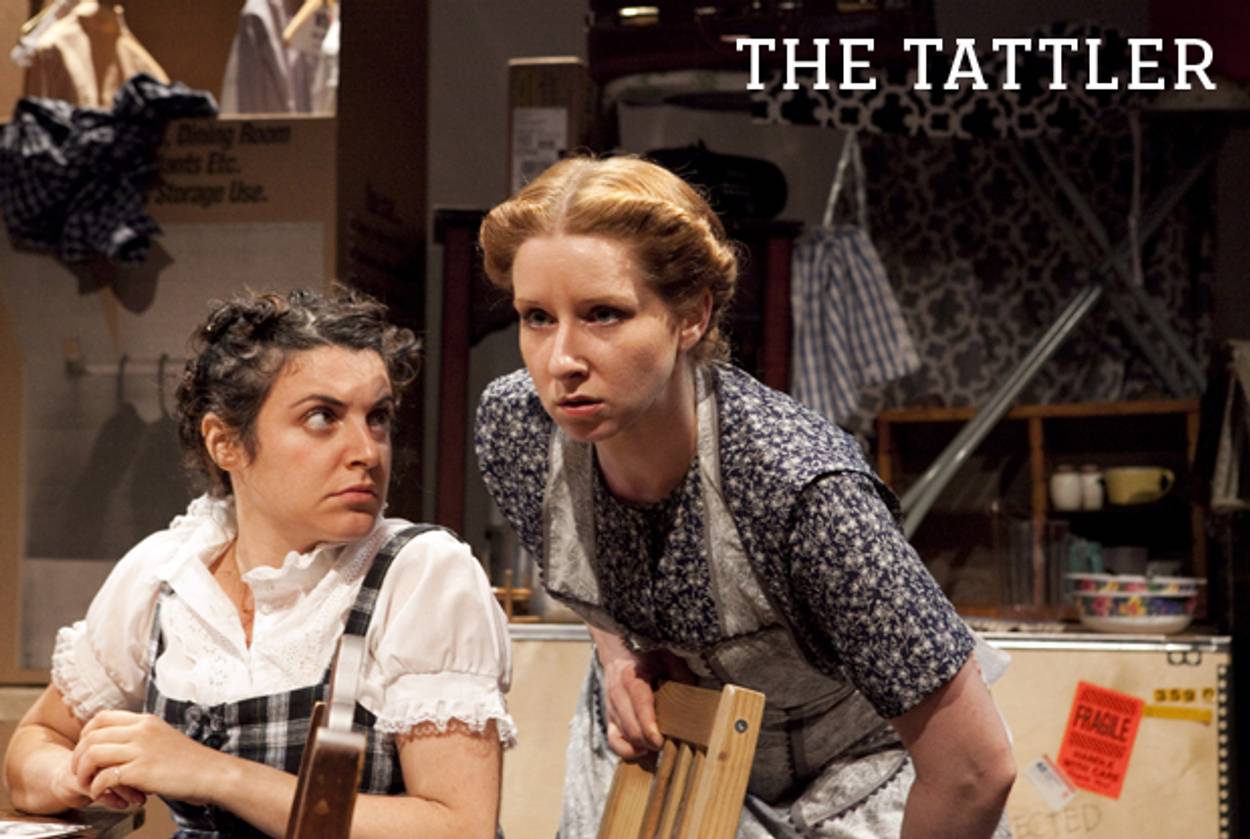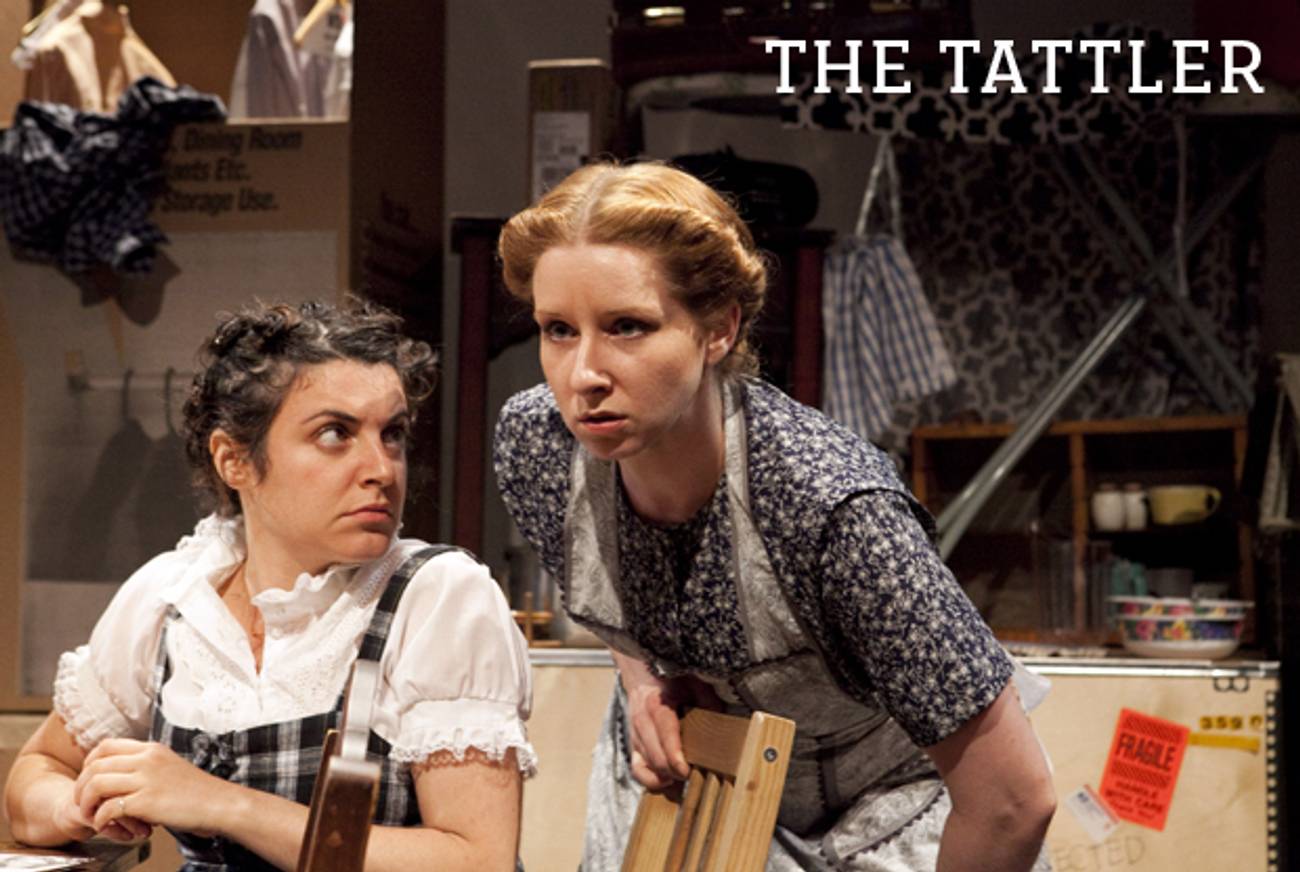Shopping for Answers
The Material World, Dan Fishback’s new musical, uses the Jewish left to ask: Are consumers the new workers?




If the old Jewish left is dying, as many elegiac trend pieces and hopeful Republican pollsters would have us believe, it has, over the past few years, come roaring back to life on New York stages. In 2009, Tony Kushner, always a trendsetter and never a stranger to exploration of various utopianisms, brought us The Intelligent Homosexual’s Guide to Capitalism & Socialism With a Key to the Scriptures. Obie-winning playwright Amy Herzog is practically a one-woman trend piece with her recent excavations of her own familly’s radical past in After the Revolution and 4000 Miles. And now, currently playing in the HOT! Festival at downtown performance laboratory Dixon Place, comes The Material World, a new musical by multi-disciplinarian artist Dan Fishback, which concerns a family of Russian-Jewish Communists in 1920s New York who grapple with Chekhovian concerns such as sisterly rivalry, political stasis, and the ever-present question of when (and if) they will return to a newly revolutionized Moscow.
Fishback is a close friend, and his director, Stephen Brackett, was actually an honor attendant at my wedding, so this isn’t a review. But even a more impartial viewer than I can see that the play raises a host of fascinating issues—chief among them, alluded to in its title, the conflict between idealism and materialism, which Fishback cleverly personifies, respectively, in his protagonist Gittel Fenster, a pre-pubescent revolutionary who scrawls Leninist creeds in her diary with all the fervor of a besotted adolescent, and her beautiful older sister Mitzi, who returns from a sleepover at the unseen proto-JAP Ruthie Feigenboim’s house with fantastical tales of flounced pink bedspreads and gorgeous dresses so numerous “she don’t even know how many she has.”
The great narrative of the 20th century is the transformation of Americans—and in typically starker dramatic fashion, since we often seem to embody such trends about 50 percent more intensely than anybody else, American Jews—from producers to consumers; from frantically sewing the clothes in sweatshops to plunking down the plastic at the Bloomingdale’s counter to pay for them. Whether this has been an entirely—or even marginally—good thing is one of the questions Fishback’s work seeks to interrogate, exhibiting a wry nostalgia for a time when change still seemed possible; when a lucid human being could believe the revolution was just around the corner. What we have gained in material comfort we have paid for in empathy, in purpose, in hope. Mitzi and her fancy dresses won in the end.
But the more things change, the more they stay the same. If the 20th century was the story of the exploitation of the workers by the bosses, its last quarter began the ongoing saga of the exploitation of consumers by corporations.
Let me explain. Classic consumer culture, for all its frivolity and tendencies toward shallowness, has a kind of honest logic to it: You go to a store, you pick out a dress, you pay a mutually agreed-upon amount of money for it. If you take it home and decide you hate it, you may, within guidelines, return the dress and receive some form of reimbursement for it. It’s a simple, fair, transaction, at least “between you and the store,” Fishback told me in a recent phone chat. “It isn’t necessarily a fair transaction for the person who made the dress,” which, fair enough, my otherwise impeccable socialist credentials are too often impaled on the end of the J. Crew sale rack, but still, you know what I mean.
As modern American society has turned more and more basic goods—transportation, money management, and most notably health care—into consumer commodities designed to maximize profit for the sellers, we increasingly see situations in which a product consistently fails to deliver what it promises, the implicit consumer contract is broken—yet in the absence of meaningful regulation, the kind we are told is “bad for business”—and the purveyor suffers no consequences. Airline travel is a perfect example. Just last weekend, I flew home from a conference in Iowa, having paid a particular price with the understanding that, within reason, I would arrive home at a pre-scheduled time. Instead, I was cast into a Planes, Trains & Automobiles-like dystopian hellscape that required 36-plus hours from which to escape. The cost to the airline was precisely nothing. I received no reductions of fare for their failure to deliver the product I had purchased, no compensation for the money I was forced to lay out for additional food, transportation, or lodging, not even so much as an apology. I might as well have been gambling in a casino. Health care, as I mentioned earlier, is even worse. I’m not a huge fan of the Affordable Care Act—the top two priorities of a Shukert administration would be a) the complete government takeover of the insurance industry and b) changing, by executive order, the national anthem from “The Star-Spangled Banner” to “Everything’s Coming Up Roses”—but those who would repeal its more useful reforms are basically fighting for the right for corporations to perpetrate a kind of legalized larceny on an enfeebled populace.
So, what is to be done? During my hours in O’Hare (and believe me, I had plenty of them) I began to envision a kind of vast union of consumers, in the tradition of the Jewish-led garment workers of old, refusing to take it anymore. A nationwide movement that would use its purchasing power to force necessary reforms; a month when no one paid their insurance premiums; a day of no air-travel, no matter what.
When I floated this idea by Fishback, he laughed. “There is already supposed to be a consumer union,” he pointed out. “It’s called Congress. And it’s broken.”
Touché. But until the electorate wakes up and demands change, I still say, let’s take a page from Madonna and express ourselves. Consumers are the new workers, and our day will come. Shoppers of the World, Unite!
***
Like this article? Sign up for our Daily Digest to get Tablet Magazine’s new content in your inbox each morning.
Rachel Shukert, a Tablet Magazine columnist on pop culture, is the author of the memoirs Have You No Shame? and Everything Is Going To Be Great. Starstruck, the first in a series of three novels, is new from Random House. Her Twitter feed is @rachelshukert.
Rachel Shukert is the author of the memoirs Have You No Shame? and Everything Is Going To Be Great,and the novel Starstruck. She is the creator of the Netflix show The Baby-Sitters Club, and a writer on such series as GLOW and Supergirl. Her Twitter feed is @rachelshukert.